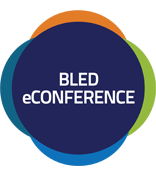The photo gallery from the 35th Bled eConference is available here.
Dear friends,
Yesterday we concluded the 35th Bled eConference.
Since 1988 when professor Gričar started the EDI conference, the conference has never been cancelled and was only postponed once. This year was the first time back in Bled after two years online and our first time hosting a hybrid conference…
Dear authors, participants and friends,
We are almost ready to start the 35th Bled eConference.
Some of us will start early on Sunday morning with the Doctoral Consortium.
Then on Monday, we hope to see as many of you as possible when we meet in Arnold hall of Rikli Balance Hotel conference centre for the plenary session, including keynotes and award ceremonies. All of the sessions will be also available online.
We wish you a safe and pleasant journey. We are sincerely looking forward to our return to Bled!
the Bled eConference team
35th Bled eConference – Digital Restructuring and Human (Re)action: June 26 – 29, 2022, Bled, Slovenia, Conference Proceedings are published and available online in open access here:
https://press.um.si/index.php/ump/catalog/book/691
The second panel related to digital health at the 35th Bled Conference is entitled Responsible Health Data Analytics.
Juergen Seitz (Baden-Wuerttemberg Cooperative State University, Germany), Laurie Hawkins (AITIA Global, Estonia and Australia), Nilmini Wickramasinghe (Swinburne University of Technology and Epworth HealthCare, Australia), Doug Vogel (Harbin Institute of Technology, China) and Luuk Simons (Delft University of Technology, Faculty of Computer Science, The Netherlands) will be discussing how the use of Global Data Analytics boosted by Covid-19 transformed the healthcare sector.
The panel will be organised as a hybrid event. You are welcome to join us either in Bled or remotely!
More information about the panel:
1. Authors presenting their papers in the conference program have 15 – 20 minutes available for presentation. Additional 10 minutes will be available for discussion.
2. The authors presenting their papers online will be able to participate through a web link or MS Teams.
3. The program will be published online, including the links for online participation.
On Tuesday morning our colleagues are preparing the first out of the two digital health-themed panels at this year’s conference.
Luuk Simons and Juergen Seitz will be joined by Doug Vogel and Nilmini Wickramasinghe in the debate regarding self-management support in e-health.
You are welcome to join us either live in the conference hall or online!
More information about the panel:
We are excited to announce a workshop on the state of small and medium-sized enterprises (SMEs) digitalization in recent years. On Monday afternoon, Marjeta Marolt from the University of Maribor, Slovenia and Andrea Kő from the Corvinus University of Budapest, Hungary will moderate a discussion on the lessons researchers from Slovenia and Hungary learnt from the digital transformation of SMEs.
SMEs are important contributors to the world’s economy. Digitalization is integral to the growth and resilience of enterprises, both large and small. However, despite the benefits and opportunities digital technologies bring, and the significant increase in uptake in recent years, many SMEs continue to lag behind in digital adoption compared to larger enterprises.
In this workshop, the invited speakers will provide an update on the current state of SMEs’ digitalization and discuss how to strengthen the resilience of SMEs and support their further growth, through the adoption of new technologies.
More about the workshop:
During the conference, the BIPER project team will present the results of the two-year BIPER (Business Informatics Programme Reengineering) project and lessons learned from pilot implementations at several universities and, finally, the “Smart City Enterprise Architectures Virtual Reality Summer School”.
The BIPER project aims to foster a collaborative partnership to develop a blended learning compatible business information systems curriculum based on shared values, eLearning experiences, and sound pedagogical principles. The challenge involves not only teaching methods and materials but also the teachers and trainers themselves. The academic field of Business Information Systems (BIS) is a complex one that combines business and organizational issues with applied information technology issues. Teaching such a multidisciplinary field, which requires not only knowledge of theoretical concepts and technical skills to use tools, but also a problem-oriented mindset and related problem-solving skills is a challenge in itself.
More about the workshop:

© 2019 Bled eConference | Contact us | Join us on Facebook | Follow us on Twitter | Follow us on Linkedin | Follow us on Flickr
Conference organizer: eCenter & Center for Education and Consulting, Faculty of Organizational Sciences, University of Maribor
